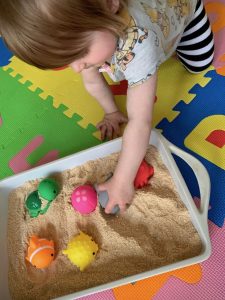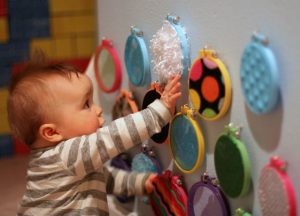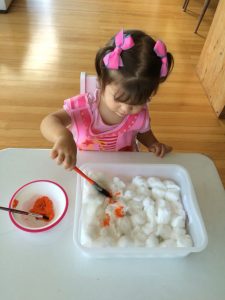Understanding What are Sensory Activities and Why are they important?

As a mother myself, I understand the deep desire to provide our kids with the best possible start in life. That’s why I’m excited to share with you the transformative power of sensory activities. From the gentle touch of a mother’s hand to the delightful sounds of laughter echoing through the room, sensory activities capture the essence of childhood exploration and wonder. At Babyhub, we’re passionate about empowering parents like you to create meaningful and engaging sensory experiences for your daughters. Let’s dive into this journey together, embracing the joy of parenthood and the limitless possibilities that sensory play has to offer.

What is Sensory Play:
Sensory play encompasses any activity that engages one or more of a child’s senses. From touching and feeling objects to smelling and tasting them, sensory play allows children to interact with their environment in a hands-on way. Whether it’s squishing playdough, listening to the sound of raindrops, or exploring different textures, sensory play provide valuable learning experiences for children of all ages. Additionally, these activities foster cognitive development, promote creativity, and enhance overall sensory awareness.
Why Sensory Activities are Important for Kids?
Sensory play encompasses a wide range of activities that engage a child’s senses, making it a cornerstone of early childhood development. The importance of sensory activities lie in its multifaceted benefits, which extend far beyond mere entertainment. Here’s a closer look at why sensory activities are so crucial for children:

Sensory Activities promotes independent thinking:
By engaging in sensory play activities, children learn to explore and discover the world around them independently.
Helps kids understand cause and effect:
Sensory play allows children to experiment and observe how their actions affect the world, helping them grasp the concept of cause and effect.
Encourages the development of fine motor skills:
Activities like pouring, scooping, and manipulating objects help children refine their fine motor skills and hand-eye coordination.
Enhances recollection, observation, and memory skills:
Sensory experiences help children develop their ability to remember and recall information, as well as sharpen their observational skills.
Boosts cognitive skills:
Engaging in sensory play stimulates the brain and promotes cognitive development, including problem-solving and critical thinking skills.
Promotes language development:
Sensory play provides opportunities for children to express themselves verbally, expanding their vocabulary and communication skills.
Encourages creativity and exploration:
From building imaginary worlds to experimenting with different materials, sensory play fosters creativity and encourages children to explore their imagination.

How to Incorporate Sensory Activities Into Your Child’s Everyday Life:
Incorporating sensory activities into your child’s daily routine doesn’t have to be complicated. Simple activities like playing with water, sand, or clay can provide hours of sensory stimulation. Additionally, you can incorporate sensory elements into everyday tasks such as cooking, gardening, or even going for a nature walk or outdoor adventures. The key is to provide opportunities for your child to engage their senses and explore the world around them in a safe and supportive environment.
Sensory activities are not just about keeping kids entertained; it’s a fundamental aspect of childhood development. By engaging in sensory play, children not only have fun but also learn valuable skills that will benefit them for years to come. As parents, incorporating sensory play into your child’s daily routine can help support their overall growth and development, making learning an enjoyable and enriching experience. So, next time you’re looking for activities to do with your child, don’t forget to include some sensory play!




